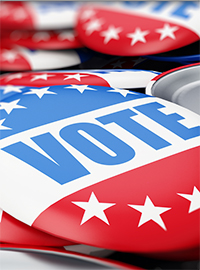| Is Trump Especially Vulnerable To Primary Challenge? |
 |
|
By Byron York
Tuesday, February 26 2019 |
It has become a common talking point for NeverTrump Republicans seeking to defeat President Trump in the 2020 GOP primaries: Polls have found that a substantial number — maybe 40 percent — of Republican voters say they would be open to a primary challenge to the president. Those surveys, the NeverTrumpers argue, show that Trump is particularly weak and vulnerable to a serious primary challenge. The problem is that it is common for voters to say they are open to a primary challenge to the president of their own party. It happened to Barack Obama in 2010-2011, before Obama went on to win re-election. It also happened to Bill Clinton in 1994-1995, before Clinton went on to win re-election. (It did not happen to George W. Bush in 2002-2003, but that was because of strong Republican support for a wartime president.) In other words, today's poll results about President Trump are not at all unusual. From his first days in office, Obama faced divisions dating to his ugly 2008 battle with Hillary Clinton. But talk about a 2012 primary challenge to Obama intensified around the 2010 midterms, when Democrats lost 63 seats in the House in an election Obama conceded was a "shellacking." Even before the 2010 elections, with prospects looking bad for Democrats, polls indicated voter openness to an Obama challenge. In a September 2010 Gallup survey, 37 percent of Democrats said they would support a Hillary Clinton primary challenge to Obama, while 52 percent said they would support Obama and 10 percent were undecided. In late October 2010, an Associated Press poll found that 47 percent of Democrats said Obama "should be challenged" in a party primary. That included 29 percent of Democrats who said they originally supported Obama in the 2008 primary battle. In late November 2010, after the midterm loss, a Marist poll asked, "Do you want another Democrat to challenge Barack Obama for the Democratic nomination for president in the 2012 primaries?" Forty-one percent of Democrats said yes — 45 percent when Democratic-leaning independents were included. In January 2011, an AP-GfK poll found that 44 percent of Democrats and Democratic-leaning independents said they would "like to see Barack Obama face a serious challenge in the 2012 presidential primaries from another Democratic candidate." Despite it all, Obama avoided a primary challenge and went on to win re-election. Things looked even worse for President Bill Clinton. After losing 54 House and eight Senate seats in the 1994 midterm elections, many Democrats were open to a primary challenge. In a December 1994 Times-Mirror poll, 66 percent of Democrats said they "would like to see" a primary challenge. By anybody's reckoning, 66 percent is a big number. Potential opponents smelled opportunity. "I think that people are going to look at the president in the next six to eight months, and they are going to make an assessment as to whether they believe that he can do the job," New Jersey Democratic Sen. Bill Bradley, a possible Clinton challenger, said in January 1995. Clinton recognized the threat, hiring staff whose job was essentially to head off a primary challenge. After he won re-election in November 1996, The Washington Post noted that "Clinton, through prodigious fundraising and behind-the-scenes courting of the party base, had escaped a primary challenge." The president between Clinton and Obama, George W. Bush, did not face a primary challenge because of the special circumstances of his first term — the Sept. 11, 2001, terrorist attacks and the war in Iraq. Although many Democrats came to oppose the war by the 2004 election, Republicans were solidly with the president after the Iraq invasion in March 2003. Fast-forward to today, after Republicans lost 41 House seats in the midterm elections. It is not at all surprising that some Republican voters would express an openness to see the president of their party, in this case Donald Trump, face a primary challenge. That's what voters do. On one hand, that reflects a measure of dissatisfaction with the president. On the other, it could be a peculiarity of polling; many people do not want to tell pollsters that their minds are closed so long before an election. "At this early point in any campaign, people are not going to shut their minds," Republican pollster David Winston said to me recently. "They just don't do that. There's a huge difference between people saying they're thinking through things and how they behave. My guess is those polls are probably true, but that's because the electorate is trying to be thoughtful." And that is more reason to remember that polls at this stage of an election don't mean much. Back in 2010, in reporting the number of Democrats who were open to an Obama challenge, The Associated Press added this caution: "Recent history shows presidents' early polling numbers mean little about their re-election prospects. At this stage two years before their re-elections, Presidents Bill Clinton and Ronald Reagan had approval ratings that were lower than Obama's now, according to the Gallup Poll; both men won a second term. The ratings for Presidents George H.W. Bush and Jimmy Carter were better than Obama's; both lost." Byron York is chief political correspondent for The Washington Examiner. |
Related Articles : |
























